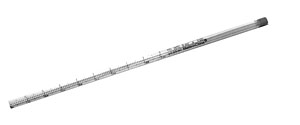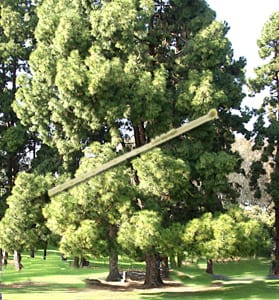RESIN RESPONSE TEST FOR PINES
Terry A. Tattar Ph. D., Professor, Department of Plant Pathology, University of Massachusetts,
Amherst, MA 01002
Introduction:
Some species of trees in the genus Pinus have very well developed resin ducts in their xylem. During much of the year these trees produce a rapid and sustained flow of resin in response to any wound in either the bark or woody issues. Injection of materials into these trees during these times has been difficult or impossible even with very low volume micro-injection capsules. In an attempt to better understand the nature of resin response in a cross section of conifers, a study was undertaken by Chris Nollstadt, a graduate student under my direction. The results of Mr. Nollstadt’s thesis were used to develop a technique to evaluate the resin flow response of a variety of conifers and to relate these responses to the ability of the trees to uptake materials presented in Mauget capsules. The resin response test for pines, reported below is a result of this master’s thesis research project.
Test Procedure for Resin Response in Pines (Based on Nollstadt, 1992):
1. Make a normal microinjection wound using a 3/16 or 15/64 inch drill bit into a test pine tree.
2. Immediately insert a glass or plastic capillary tube, 1 1/2 inch length, into the drill hole. Select a diameter Capillary tube that fits snugly into the hole. Insert the tube to a depth just inside the cambium, in a position similar to a inserted feeder tube.
3.Determine how long it takes for the capillary tube to fill with resin.
Reading the Test:
A. If the tube fills in 10 minutes or less, it is not possible to inject at this time.
B. If the tube fills in 10 to 20 minutes, it may be possible to inject a low volume (1 .2 ml).
C. If the tube fills in 30 minutes, it may be possible to inject most 4 ml volume materials.
D. If the tube does not fill for 2 hours or longer, high volume materials, such as 6 ml nutrient solutions, may be considered.
Reference: Nollstadt, C. 1992. Effects of xylem resin on trunk injection of systemic chemicals in conifers. Master Thesis. University of Massachusetts. 61 p.


